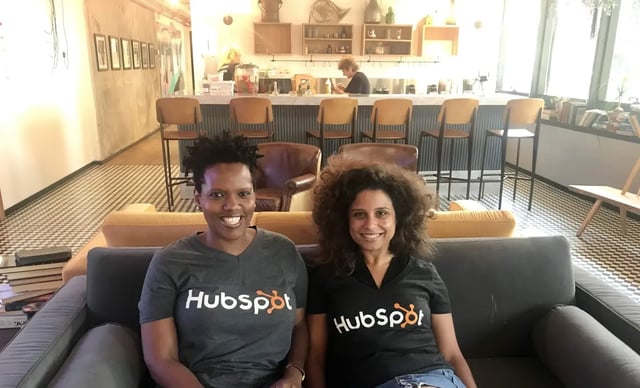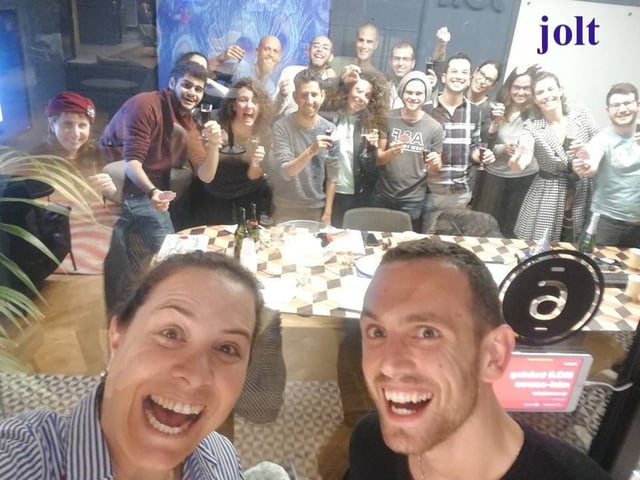To make it easier for you, I divided the article into 3 parts:
-
How I started when I was 16.
-
Places you can begin learning about Sales, Inbound Sales, and Marketing.
-
Main points to help you develop your Inbound Strategy and increase Sales.
1. How I Started When I Was 16
I hate to sell. Getting a "NO" is a downer for me.
It all started 13 years ago when my childhood friend and I went searching for a job in order to save up to go on a trip. At that time, the internet was unsophisticated, smartphones were nonexistent, and technology was not helpful in our search to find work.
One day, we decided to go to the main street of our town, Holon. We asked each store if they had any job openings for us. Back then, Sokolov street was a vast, long road with a variety of stores. There you could buy clothes, books, groceries, home goods and much more. After spending the whole day going from store to store, we raised a white flag. Seemingly, there was not a single store that had any extra work that needed to be done or that was interested in hiring 16-year-olds. We felt a bit embarrassed, and were incredibly disappointed.

Sweet Sixteen! We had to find a job and save some money (we also organized some great parties.)
2. Places you can begin learning about Sales, Inbound Sales, and Marketing.
Two years ago, I had a similar experience which gave me deja-vu. I decided to open a company that helps start-ups implement or improve their Customer Relationship Management (CRM) operations by creating more automated sales processes. (This is called Sales Operations.)
Now, when you think about becoming a consultant, you may think of a clear job such as becoming a graphic designer, programmer, or even a sales trainer. However, knowing my title was different. I took a small niche within the field of sales, called sales operations, and converted it into something I could outsource. As a result, no one knew what I did or how I could genuinely help them.
In spite of this, I set off to learn the core principles of marketing from experts — defining my target market and personas in those relevant companies. Unfortunately, I still wasn't clear enough about how I could get to a correct understanding of who genuinely needed my service and who did not.
I kept the following questions in mind:
-
How could I find the right companies and people who needed my help?
-
How could I approach those right people and their company, in a way where I would not annoy them?
-
How could I explain my value to a company?
The main, underlying question was: How could I avoid spending time on unsuitable companies, people who wouldn’t be interested in what I had to offer, and people who would find me super annoying?
Then, I remembered my telemarketing experience which had taught me that we should spend considerable time cold calling people who weren’t happy to hear us. I knew that was, without a doubt, not the salesperson I wanted to be. Sure, I did try to send cold emails and LinkedIn messages to see how people would react. But, even when I was doing considerable research about any company or person, I spent a great deal of time without seeing good results.
Then my real journey started — my learning journey. I set a goal for myself to learn how to sell. I chose to start by learning and exploring Inbound.
HubSpot certificates and Jolt School supported me in my learning journey and taught me new and creative sales methodologies.

Together with Resa from CacaoMedia- HubSpot Platinum Partner
HubSpot Certificates
HubSpot has made quite an astonishing change in the last decade. They re-invented the fields of Marketing and Sales with new methodologies and practical tools, focusing on Inbound Marketing and Sales strategies.
Inbound Marketing involves interested leads actively contacting you because they need your help to get a job done. These leads have learned through various indirect means that you could be a solution to their problem (i.e. google search, content marketing such as YouTube videos, blog posts, social media, etc.)
HubSpot has managed to show salespeople how having an Inbound lead would be much stronger in the sales process.
Some of HubSpot's online free courses can be found below-
Applying to Be a Student at Jolt
Jolt is a start-up in Tel Aviv that educates high tech professionals with relevant content and tools that universities do not provide them. They are practical and short lessons to help people quickly learn 21st-century skills, mostly related to technology. At Jolt, Sales and Marketing lessons are being taught by top sales professional from all over the world. So, I decided to learn from them.
Now, after a year, I can say that it has helped me very much to overcome my fear of selling. I became less shy and heard a lot of different opinions from many speakers and smart students. It also brought me closer to the fantastic people thank to the supportive and welcoming community as many had dealt with problems similar to those I deal with.

Celebrating MOJI Course - Moderator of Jolt
3. Main points to help you develop your Inbound Strategy and increase Sales
Get Exposed to the World
One of the things I thought about when I started my business was that everyone in my field already knows what my company does. Logically, creating a website was my next step. Then I began strategizing, writing the content, and waiting for potential customers to knock on my door. Of course, I tried to contact companies and research potential clients, but I did not doubt that all the people I knew working in high tech would unquestionably understand what I do, and how it brings value to companies. That was my biggest mistake.
One year after I started, a friend told me that my Facebook page was neither available nor connected to my profile, although I thought it was. I went to confirm what she had told me and was surprised to find out that my profile wasn't connected properly. I immediately changed it, my profile got updated, and people started to congratulate me on my NEW JOB! REALLY?
Exposure can be so many things: Telling people what you do, how you can help, publishing on social media daily, having coffee with interesting people and telling them about what you do and what your aspirations are.
It is important that you ensure that every potentially relevant person knows what you do precisely, but this is just the first step.
Gain People's Trust by Trying to Help Sincerely
Trust is a strong word, and so gaining people's trust won't happen just by messaging or calling them. Giving something can help you gain one's trust. What do I mean?
We always offer a free audit and assessment of a potential client's CRM system (HubSpot or Salesforce.) Why? Because being helpful and giving them value is the foremost step to make them trust us. Doing this takes about a half hour per client and shows my professional competencies, while also showing it would be next to impossible for the client to do it himself. Those clients get to understand better their CRM systems, and any problems or issues they have which I always back up with data and proofs. This is now a physical asset that I’ve given to them that they’ll have access to no matter if we start working together or not.
These potential clients saw my knowledge and understood the value of the project or how they can change some habits and mindsets to scale their sales in the future.
People Are EVERYTHING, Let's Talk About It
People start companies, completely change industries, and other people's lives. If you don't know enough people, it's harder to make progress. So, for example, when I started to take meetings, I noticed something interesting happened. I began to exist in the ecosystem. Suddenly, I met this guy who had a connection to someone I had helped some time ago, who's a friend of some friends who are community managers, and all are in the same circles. Once you know many people, you start to notice those circles and make connections through them -- you may even start connecting and introducing other people to each other.
Try to Have References Which also Act as Promoters
Having references that are also promoters is difficult, and I'm not even sure I've made it to this stage. The highest level you can reach is to get your customers or network to become your promoters.
What does this mean exactly? Here are some examples.
-
Customers or other connections who would recommend you or tag you on Facebook without you asking for it
-
People who come consistently to your events and continue to talk about you
-
Relationships which give you suggestions for new business without any financial interest
-
People who are ready to invest a significant amount of time in your projects for free
At this time, I'm still researching and learning about the "how to do" part. Hopefully, there will be some new insights to share with you soon.
As always, I am happy to hear your thoughts!
Yours,
Rose,


.png?width=80&name=photos%20team%20(4).png)
Comments